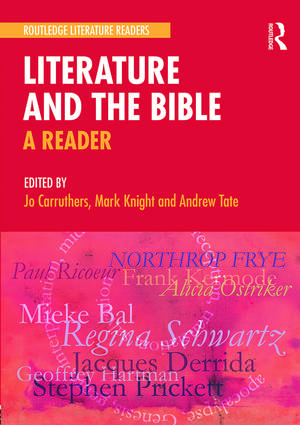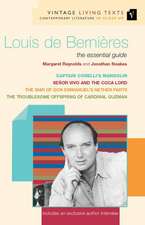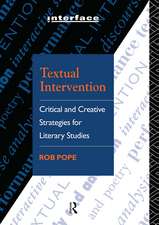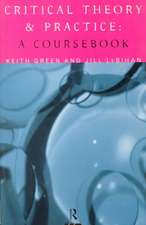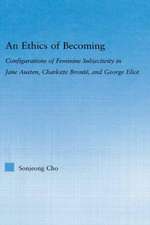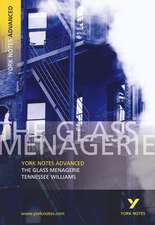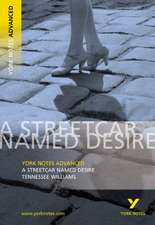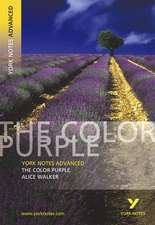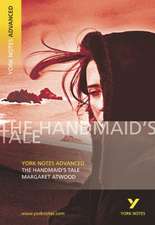Literature and the Bible: A Reader: Routledge Literature Readers
Editat de Jo Carruthers, Mark Knight, Andrew Tateen Limba Engleză Paperback – 13 aug 2013
In the last thirty years there has been a growth of critical interest in this relationship. In Literature and the Bible: A Reader the editors bring together a selection of the key critical and theoretical materials from this time, providing a comprehensive resource for students and scholars.
Each chapter contains:
• An introduction from the editors, contextualising the material within and alerting readers to some of the historic debates that feed into the extracts chosen
• A set of previously published extracts of substantial length, offering greater contextualisation and allowing the Reader to be used flexibly
• Lists of further reading, providing readers with a wide variety of other sources and perspectives.
Designed to be used alongside the Bible and selected literary texts, this book is essential reading for anyone studying Literature and the Bible in undergraduate English, Religion and Theology degrees.
Preț: 330.10 lei
Preț vechi: 374.10 lei
-12% Nou
Puncte Express: 495
Preț estimativ în valută:
63.18€ • 65.70$ • 52.87£
63.18€ • 65.70$ • 52.87£
Carte tipărită la comandă
Livrare economică 15-29 martie
Preluare comenzi: 021 569.72.76
Specificații
ISBN-13: 9780415698535
ISBN-10: 0415698537
Pagini: 392
Dimensiuni: 174 x 246 x 25 mm
Greutate: 0.68 kg
Ediția:1
Editura: Taylor & Francis
Colecția Routledge
Seria Routledge Literature Readers
Locul publicării:Oxford, United Kingdom
ISBN-10: 0415698537
Pagini: 392
Dimensiuni: 174 x 246 x 25 mm
Greutate: 0.68 kg
Ediția:1
Editura: Taylor & Francis
Colecția Routledge
Seria Routledge Literature Readers
Locul publicării:Oxford, United Kingdom
Public țintă
Postgraduate and UndergraduateCuprins
Part 1: The Relationship Between Literature and the Bible Chapter 1. Introducing the Study of Literature and the Bible Introduction and Further Reading (a) Erich Auerbach, ‘The Scar of Odysseus’ from Mimesis: The Representation of Reality in Western Literature (b) Hans Frei, The Eclipse of Biblical Narrative (c) Meir Sternberg, The Poetics of Biblical Narrative: Ideological Literature and the Drama of Reading (d) Susan A. Handelman, The Slayers of Moses: The Emergence of Rabbinic Interpretation in Modern Literary Theory Chapter 2. Ways of Reading Introduction and Further Reading (a) Stephen Prickett, Words and The Word: Language, Poetics and Biblical Interpretation (b) David Lyle Jeffrey, People of the Book: Christian Identity and Literary Culture (c) Emmanuel Levinas, Beyond the Verse (d) Geoffrey Hartman, ‘The Struggle for the Text’ in Geoffrey Hartman and Sanford Budick, eds., Midrash and Literature Chapter 3. Reception History Introduction and Further Reading (a) Wolfgang Iser, ‘Conditions of Interaction’, from The Act of Reading: A Theory of Aesthetic Response (b) Hans-Georg Gadamer, Truth and Method, 2nd rev ed., Trans. Joel Weinsheimer and Donald G. Marshall (c) Yvonne Sherwood, A Biblical Text and its Afterlives: The Survival of Jonah in Western Culture Part 2: Literary Reading Chapter 4. Translation Introduction and Further Reading (a) Walter Benjamin, ‘The Task of the Translator’, in Illuminations. Ed Hannah Arendt (b) Gerald Hammond, The Making of the English Bible (c) Robert Alter, ‘To The Reader’, in Genesis (d) Jacques Derrida, ‘Des Tours de Babel’ in Jacques Derrida, Acts of Religion, ed. Gil Anidjar (e) Valentine Cunningham, ‘Thou Art Translated: Bible Translating, Heretic Reading and Cultural Transformation’ Chapter 5. Multivocality Introduction and Further Reading (a) Mikhail Bakhtin, ‘Discourse and the Novel’ in Dialogic Imagination: Four Essays, trans., Caryl Emerson and Michael Holquist (b) Daniel Boyarin, ‘Towards a New Theory of Midrash’, from Intertextuality and the Reading of Midrash (c) Alicia Ostriker, ‘Psalm and Anti-Psalm: A Personal Interlude’ (d) David Tollerton, ‘Reading Job as Theological Disruption for a Post-Holocaust World’ Chapter 6. Metaphor & Allegory Introduction and Further Reading (a) Northrop Frye, ‘The Double Vision of Language’ (b) Paul Ricouer, ‘The Nuptial Metaphor’ (c) Harold Fisch, Poetry with a Purpose: Biblical Poetics and Interpretation Part 3: Theological Interpretation Chapter 7. Parables Introduction and Further Reading (a) Frank Kermode, The Genesis of Secrecy (b) J. Hillis Miller, Tropes, Parables and Performatives (c) Sally McFague Teselle, Speaking in Parables: A Study in Metaphor and Theology (d) Susan Colon, Victorian Parables Chapter 8. Genesis Introduction and Further Reading (a) Stanley Fish, Surprised by Sin: The Reader in Paradise Lost, 2nd ed (b) Regina Schwartz, Remembering and Repeating: Biblical Creation in Paradise Lost (c) Terry Wright, The Genesis of Fiction: Modern Novelists as Biblical Interpreters (d) Mieke Bal, ‘First Memories and Second Thoughts’ in Loving Yusuf: Conceptual Travels from Present to Past Chapter 9. Salvation, Transformation and Apocalypse Introduction and Further Reading (a) Graham Ward, ‘Suffering and Incarnation’, in Ward, ed., The Blackwell Companion to Postmodern Theology (b) Eve Kosofsky Sedgwick, Epistemology of the Closet (c) Paul Fiddes, The Promised End: Eschatology in Theology and Literature (d) Jon Roberts, ‘Wordsworth’s Apocalypse’
Recenzii
'...plenty of sparkling and stimulating material that should give rise to lively interest and good discussion. The book is substantial, well-presented and carefully organised; there is nothing quite like it available. I hope it will be widely used.' The Glass, Journal of the Christian Literary Studies Group
'Recommended.' - Choice
'Recommended' - Choice
'Recommended.' - Choice
'Recommended' - Choice
Descriere
The editors bring together a selection of key critical and theoretical materials from the last thirty years or so that focus on the long and complex relationship between the western literary tradition and the Jewish and Christian scriptures. Arranged across nine sections, eachcontains an introduction, approximately four previously published extracts, and further reading lists. This book is essential reading for anyone studying Literature and the Bible on undergraduate English, Religion and Theology degrees.
